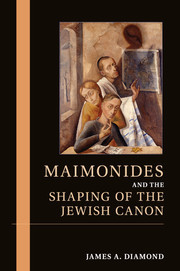Description
Maimonides and the Shaping of the Jewish Canon
Author: Diamond James A.
This book examines a wide range of theologians, philosophers, and exegetes who share a passionate engagement with Maimonides.
Language: English
Subject for Maimonides and the Shaping of the Jewish Canon:
Approximative price 39.35 €
In Print (Delivery period: 14 days).
Add to cart
Maimonides and the Shaping of the Jewish Canon
Publication date: 03-2017
Support: Print on demand
Publication date: 03-2017
Support: Print on demand
Approximative price 111.55 €
In Print (Delivery period: 14 days).
Add to cart
Maimonides and the Shaping of the Jewish Canon
Publication date: 10-2014
Support: Print on demand
Publication date: 10-2014
Support: Print on demand
Description
/li>Contents
/li>Biography
/li>
Jewish thought since the Middle Ages can be regarded as a sustained dialogue with Moses Maimonides, regardless of the different social, cultural, and intellectual environments in which it was conducted. Much of Jewish intellectual history can be viewed as a series of engagements with him, fueled by the kind of 'Jewish' rabbinic and esoteric writing Maimonides practiced. This book examines a wide range of theologians, philosophers, and exegetes who share a passionate engagement with Maimonides, assaulting, adopting, subverting, or adapting his philosophical and jurisprudential thought. This ongoing enterprise is critical to any appreciation of the broader scope of Jewish law, philosophy, biblical interpretation, and Kabbalah. Maimonides's legal, philosophical, and exegetical corpus became canonical in the sense that many subsequent Jewish thinkers were compelled to struggle with it in order to advance their own thought. As such, Maimonides joins fundamental Jewish canon alongside the Bible, the Talmud, and the Zohar.
Introduction: Moses Maimonides: anchoring Jewish intellectual history; 1. Setting the stage for the future of Jewish thought; 2. Maimonides on Maimonides: loving God rabbinically and philosophically; 3. Nahmanides on Jewish identity (thirteenth century): launching the Kabbalistic assault; 4. R. Yom Tov ben Abraham Ishbili (thirteenth-fourteenth centuries): pushing back the assault; 5. Isaac Abarbanel (fifteenth century): the Akedah of faith versus the Akedah of reason; 6. Meir Ibn Gabbai (sixteenth century): the aimlessness of philosophy; 7. Spinoza (seventeenth century) and a Buberian afterword (twentieth century): reorienting Maimonides's scriptural hermeneutic; 8. Hermann Cohen (nineteenth century): a new religion of reason out of the sources of Maimonides; 9. R. Naftali Zvi Yehuda Berlin (ninteenth century): loving God strictly rabbinically; 10. R. Abraham Isaac Kook (twentieth century): a Kabbalistic reinvention of Maimonides's legal code; Conclusion: the Maimonidean filigree of Jewish thought: Kafka, Scholem, and beyond.
James A. Diamond holds an endowed chair in Jewish Studies at the University of Waterloo, Ontario. He is a leading authority on medieval Jewish thought and philosophy, and his studies have been published widely in all the prominent journals in the fields of Jewish studies, religious studies, and philosophy. His previous two books each garnered the Canadian Jewish Book Award for best scholarly book in the field of Jewish studies, and his last book on Maimonides and the Outsider was chosen in 2008 as a Notable Selection by the Jordan Schnitzer Book Awards in the Category of Philosophy and Jewish Thought for best book in the previous four years.
© 2024 LAVOISIER S.A.S.




